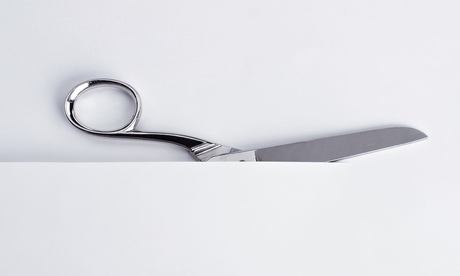
Henry James called editing "the butchers' trade". But he also said, "I glory in the piling up of complications of every sort," so you can see how the old anglophile and his editors may have crossed horns.
However, if we're honest, wouldn't we, the reader, prefer to chew over a well-honed slice of literature than wade through fatty hunks of unedited, flabby prose? Isn't the editor's first loyalty to the reader, and not the author? Isn't it better to wield the knife than to club out something that the cow might approve of?
This weekend, as part of the New Zealand festival, The Luminaries author and winner of the Man Booker prize, Eleanor Catton, discussed deletion, deadlines and several other facets of the writer-editor relationship with her British editor Max Porter. If this sounds a little like sitting down with your ex-husband to publicly discuss why he always disliked your sense of humour, then think again; the modern editor is, according to Porter, "part proofreader, part therapist, part in-house champion and, increasingly, there to put a marketisation on the written word." This was less meat cleavers at dawn, more gentle emails about getting off Twitter.
With 391,000 books being self-published in the US in 2012 alone, the old 20th-century model of the creative editor is, according to Porter, "an endangered species". While Porter described his role as "like making a pot" alongside a writer "using gentle tweaks and nudges", it is nevertheless a "highly irritable occupation". And a thankless one, judging from Catton's anecdote about sitting next to Germaine Greer at an awards ceremony as Greer leant over and whispered very loudly that, "there's no such thing" as a good editor.
At its foundation the role of the editor is a blend of meddler and midwife. You're expected to not just pinch, pluck and pull a novel into shape, but, in many cases, make sure the thing is being written at all.
When he took on the job at Granta, Porter was told that Eleanor Catton was "at work on a slim novella; something to do with stars". And so, great traps are laid. Porter inherited a half-finished manuscript – "I think that's putting it generously" – and a publishing schedule that meant, at times, having to resort to somewhat blunt tools to get the thing delivered. "About two hours after I joined Twitter I got an email from Max," says Catton. "The subject was 'Twitter?!?!' and the body of the email just said '#murderweapon'. "
The destructive power of Twitter is a danger only too familiar to modern writers. Salman Rushdie has now quit the time-murdering social media monster to finish a new book, while Neil Gaiman has spent much of this year tweeting about his own Twitter sabbatical. However, in the case of some writers, editors have to take a more hands-on approach to such avoidance behaviour. Douglas Adams, the man who famously said, "I love deadlines. I like the whooshing sound they make as they fly by," was locked into a hotel room with his editor, Sonny Mehta, until he'd finished So Long, and Thanks for All the Fish.
As well as nannying a novel into existence, the modern editor is also tasked with protecting the writer from some of the harshest commercial winds - building them a nest in which they can, hopefully, produce greatness. "She was watching whole series of Breaking Bad while I was eating my thumbs," joked Porter, who described much of his editing role with The Luminaries as "disguising pressures from [Catton] while letting you know that you were nudging terrible lateness."
Perhaps, however, the greatest role of the editor, particularly in the case of a book as enormous as The Luminaries, is to give a bird's eye view of the project. As Stephen King wrote in On Writing: A Memoir of the Craft: "when you write a book, you spend day after day scanning and identifying the trees. When you're done, you have to step back and look at the forest."
Reading the whole book again, in its entirety, from start to finish on the plane over to Wellington, Max Porter was, he said, moved to tears. Even after months, if not years, of picking apart sentences, scenes and syntax, it speaks volumes that an editor can still be bowled over by the novel as a whole. Does a butcher weep over the beauty of his lamb chops? I think not.
An editor may be butcher, but they are also a midwife, a parent, a nanny, a matron, a therapist, a conspirator and a friend. But don't forget that, in the end, only a butcher can turn a live, stamping, snorting, animal into something you can stomach. So perhaps it's time we heard it for the butchers. Sorry, Henry.

